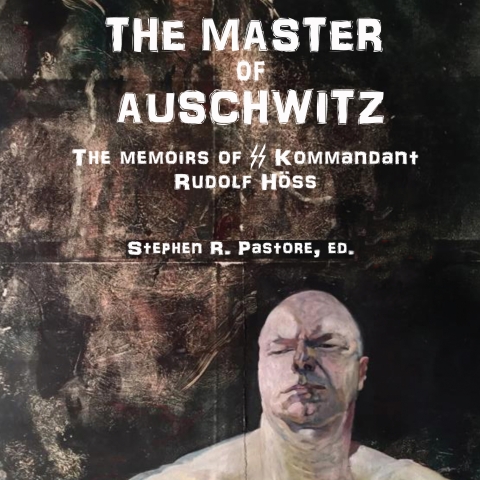Above is the new artwork for my latest audiobook out in the next week or so. This was a tougher read than I imagined in various ways. Kommandant Hoess was not always the most eloquent writer but really the interest is in the subject matter as portrayed by Hoess (which I haven't misspelt by the way just can't get an umlaut on my keyboard). Hoess has an odd psychology finding the breaking of minor rules or his own experiences in gaol to be seemingly of much more consequence than his overseeing of mass murder. His attempt to explain himself is jejune and see-through with elements of his true personality coming through.
He was a plain kind of person one feels, a kind of blank, upon which someone like Himmler could stamp their impression upon. His line is essentially that he was just following orders and he was someone who was happier doing that than thinking for himself very much but he calls himself a born soldier which really doesn't play well with the notion of overseeing the efficient working of gas chambers to murder hundreds of thousands and the shootings of defenceless children and adults. Though certainly he wasn't too analytical he is certainly attempting to justify himself in this 'autobiography' which he wrote in the weeks before his execution.
It's not as grim as it could be in its details mostly because he sweeps over the emotions connected with the killing of people. He was not a zealot like Eichmann and doesn't seem too interested in the people he conveyed to death. Rather than cold he is detached from what he participated in
but he felt some guilt, the fact that he tries to explain himself in the way he does reveals that. He wishes his life had led him elsewhere he says that at heart he would have been happy as a farmer. This was historically an important document I think because it gave some of the first detailed facts about the genocide(s). Today we are more familiar with the details so, as I say, it is the psychology that is perhaps most interesting, certainly to those who are informed about the details. It should be noted however that in terms of the details Hoess gives, most are basically accurate but the statistics he gives are not always correct and that should be kept in mind if you quote any of this material.
He was a plain kind of person one feels, a kind of blank, upon which someone like Himmler could stamp their impression upon. His line is essentially that he was just following orders and he was someone who was happier doing that than thinking for himself very much but he calls himself a born soldier which really doesn't play well with the notion of overseeing the efficient working of gas chambers to murder hundreds of thousands and the shootings of defenceless children and adults. Though certainly he wasn't too analytical he is certainly attempting to justify himself in this 'autobiography' which he wrote in the weeks before his execution.
It's not as grim as it could be in its details mostly because he sweeps over the emotions connected with the killing of people. He was not a zealot like Eichmann and doesn't seem too interested in the people he conveyed to death. Rather than cold he is detached from what he participated in
but he felt some guilt, the fact that he tries to explain himself in the way he does reveals that. He wishes his life had led him elsewhere he says that at heart he would have been happy as a farmer. This was historically an important document I think because it gave some of the first detailed facts about the genocide(s). Today we are more familiar with the details so, as I say, it is the psychology that is perhaps most interesting, certainly to those who are informed about the details. It should be noted however that in terms of the details Hoess gives, most are basically accurate but the statistics he gives are not always correct and that should be kept in mind if you quote any of this material.

 RSS Feed
RSS Feed
